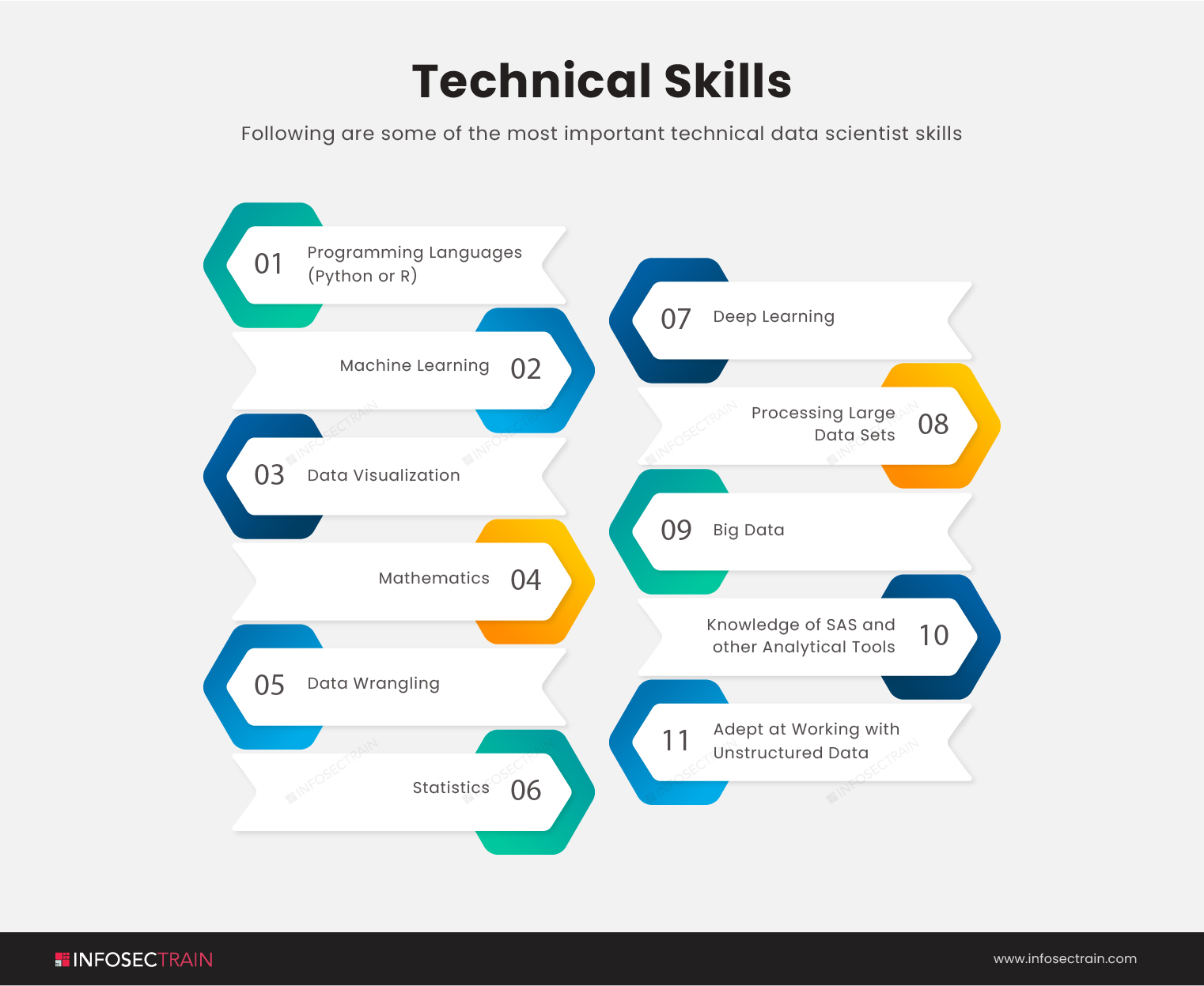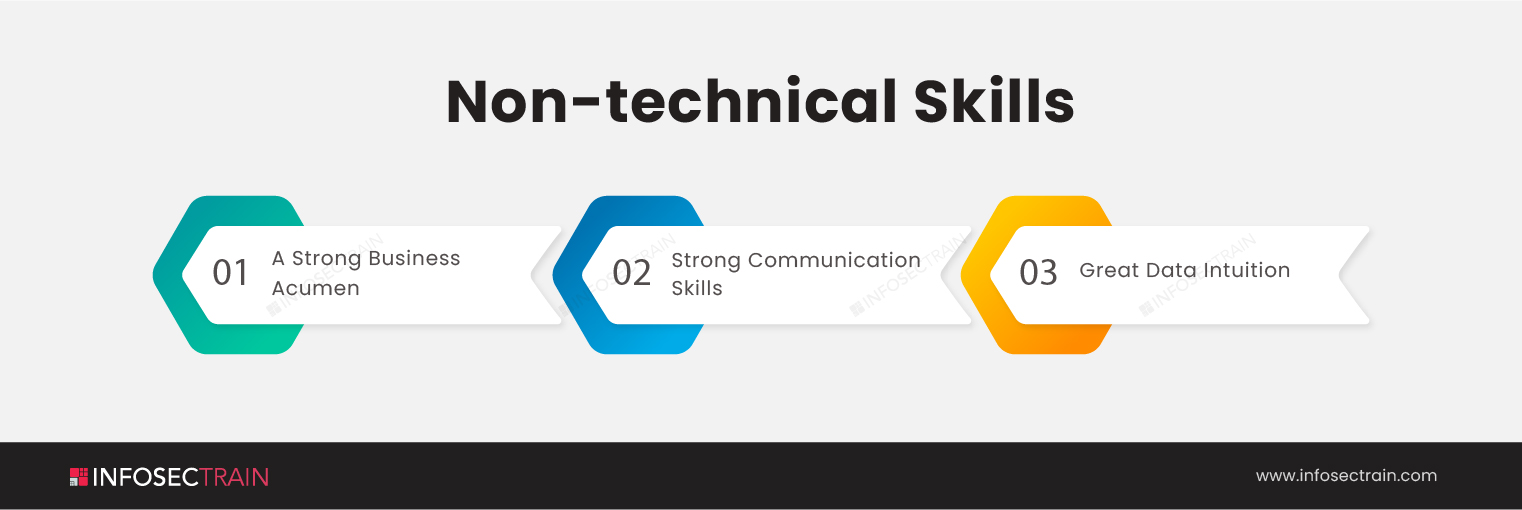Top Skills That You Should Master to Become an Awesome Data Scientist
As the demand for Data Scientists rises, the field becomes more appealing to students and working professionals. Thanks to big data’s role as an additional perspective engine, Data Scientists are in high demand at the organizational level across all vertical markets. Organizations are constantly relying on Data Scientist skills to keep a step ahead of the competition, even if it is to improve customer retention, refine product development, or mine data for new business opportunities.

So in this article, we will discuss the top skills required for Data Scientists:
Skills Required to Become a Data Scientist
Let’s look at two different types of skills needed to become a Data Scientist:
- Technical Skills
- Non-technical Skills
Let us now look at the technical skills required for the role of a Data Scientist.
Technical Skills Required to Become Data Scientist
Following are some of the essential technical Data Scientist skills:

1. Programming Languages (Python or R)
To be a Data Scientist, you need to know programming languages such as Python, R, Java, Perl, C/C++, and SQL. Python and R are the most common coding languages required for data science roles. Data Scientists can use these programming languages to organize unstructured data sets.
- Python: As your knowledge of Python fundamentals grows, you’ll want to look into Python libraries, which are replaceable pieces of code that you can use instead of rewriting basic instructions.
- R: R is an open-source statistical programming language with tools for presenting and interacting data-driven outcomes.
- SAS: SAS is a software package that includes installed statistical functions and a Graphical User Interface (GUI) to assist non-technical users.
2. Machine Learning
The process of writing code that allows a computer to learn from initially stored data is known as machine learning. Machine learning is helpful for data scientists because it allows them to make essential estimations for wise decisions in an authentic way without the need for human involvement.
3. Data Visualization
The process of interacting and converting data and information in a visual context, typically using a graph, chart, bar, or another visual aid, is known as data visualization. In visualization, images are also used to converse the relationships between various data sets.
- Power BI: Power BI is available in desktop, mobile, and cloud versions, and it generates a variety of visualization techniques using Azure, SQL, and Excel. Beginners will find it simple to pick up.
- Tableau: Tableau is a more sophisticated tool with increased speed and functionality. Users can create reports (heat maps, line charts, scatter plots, and so on) and stunning dashboards using drag-and-drop functions.
4. Mathematics
Mathematics is essential for data science because mathematical concepts aid in identifying patterns and the development of algorithms. Putting such algorithms into practice in data science necessitates a thorough understanding of multiple statistics and probability theory concepts like:
- Linear Algebra: Linear algebra is the fundamental basis of many popular algorithms, and identifying matrices and vectors will be highly beneficial, particularly if you excel in machine learning.
- Multivariate Calculus: Refresh your knowledge of mean value theorems, gradients, derivatives, limits, the product and chain rules, Taylor series, and beta and gamma functional areas.
5. Data Wrangling
After gathering data from various sources, you’ll almost certainly come across some sloppy data that needs to be overhauled. Data wrangling is based on coding languages and assists in the correction of data flaws such as incomplete data, chain formatting, and date formatting. It is also necessary to map data fields from the source to the destination.
6. Statistics
Statistics is a collection of mathematical methods and tools that allow us to answer important data questions. Every company is attempting to become data-driven. This is why there is such a high demand for Data Scientists and Analysts. We must now make sense of the data to solve problems, answer questions, and map out a strategy. Fortunately, statistics provides a set of tools for obtaining those insights. Sub-fields of statistics are:
- Probability: As a Data Scientist, you’ll need to know about Bayes theorem, probability distribution functions, the Central Limit Theorem, expected values, standard errors, random variables, and independence.
- Statistical Analysis and Computing: It is the theory and practice of collecting, analyzing, and presenting large amounts of data to uncover hidden patterns and trends. Statistics are used on a daily basis to create more scientific decisions in research, industry, and government.
7. Deep Learning
It is a branch of computer science based on computer algorithms that learn and improve independently. Deep learning utilizes deep neural networks to simulate how humans think and learn instead of machine learning, which uses more straightforward concepts.
8. Processing Large Data Set
Large data processing is a collection of techniques or frameworks for accessing large amounts of data to obtain helpful information for decision support and assistance.
9. Big Data
Big data is regarded as a high quantity, high velocity, or diverse set of data resources that necessitate unique forms of processing to enable better decision making, insight discovery, and process optimization. There has been a massive increase in data due to apps and social media development and growth, and people and businesses are moving online. Simply looking at social media platforms, we can see that they interact and attract over a million users every day, allowing data to grow faster than ever before. So a deep understanding of big data is essential for data science.
10. Knowledge of SAS and other Analytical Tools
Acknowledging analytical tools is a vital Data Scientist skill for discovering valuable information from a well-organized dataset. SAS, Hadoop, Spark, Hive, Pig, and R are the most popular data analytics tools used by Data Scientists. Certifications like SAS data science certificate can help you gain this valuable data scientist skill by establishing your expertise in these analytical tools.
- SQL: In relational database management systems, SQL allows you to store, query, and manipulate data.
- Spark: Spark is a handling source that can operate with massive, unstructured datasets and easily integrate with Hadoop.
- Hadoop: Hadoop is an Apache Software Foundation open-source software library for distributing big data processing over a group of computing devices.
11. Adept at Working with Unstructured Data
Data Scientists must have similar responsibilities with unstructured data from various sources. For example, a Data Scientist who is working on a project to assist the marketing team with providing insightful data analysis should also be familiar with social media.
Non-technical skills Required to Become Data Scientist
We’ll now focus on non-technical skills that are required to become a data scientist, in addition to technical Data Scientist skills. It includes:

1. Strong Business Acumen: Strong business acumen is the most effective way to channel technical skills. Without it, an aspiring Data Scientist may be unable to identify the issues and challenges that must be addressed for a company to grow.
2. Strong Communication Skills: Communication is the next most important Data Scientist skill. Data scientists are experts at extracting, interpreting, and analyzing data. However, for you to be successful in your role and for your organization to benefit from your services, you must be able to communicate your findings effectively with team members who do not share your professional background.
3. Great Data Intuition: One of the essential non-technical Data Scientist skills is great data intuition. In large data sets, valuable data insights are not always obvious, and a skilled Data Scientist has intuition and knows when to look beyond the ground for helpful information.
Data Science with InfosecTrain
Data Scientists are known as “professionals with a wide range of skills that are rarely found in a single person.” This explains why Data Scientists are in such high demand, and why becoming one can be difficult. However, proper training and certification for Data Scientists are commonly the essential foundation for excellence. Enroll in InfosecTrain’s Data Science Program today to take the first step toward your career goals.







 1800-843-7890 (India)
1800-843-7890 (India)